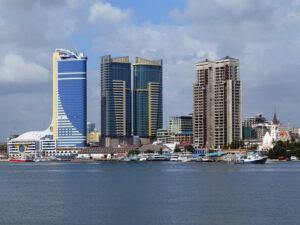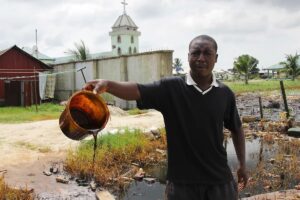- Dawood Al Shezawi: Why AIM Congress 2024 is the epicenter of global economic and cultural dialogues
- d.light’s 600,000 cookstoves project verified as top source of quality carbon credits
- Artificial intelligence (AI) could create a turning point for financial inclusion in Africa
- AIM Congress 2024: Catalysing global investments with awards
- Kenya’s economic resurgence in 2024
- The most stressful cities to live in 2024 exposed
- Tech ventures can now apply for the Africa Tech Summit London Investment Showcase
- State of journalism survey 2024 shows media houses are lagging in AI adoption
Opinion
- Artificial intelligence in Africa can potentially propel the fintech industry into a new era of financial inclusion.
- AI tools can analyse data from client discussions, producing legal documents in simple language and at a fraction of what it would typically take to draft a contract.
- Banks, for example, can make their services more affordable to their customers by rolling out AI-powered chatbots to handle routine queries while sparing them from having to travel to a bank branch.
It’s difficult to imagine a time before the widespread adoption of mobile technology in Africa – particularly where financial services are concerned. For millions of unbanked people, transactions were limited to cash, postal services or even the barter system.
Now, in much the same way as mobile payments completely disrupted the status quo, AI has the potential to propel the fintech industry into a new era of financial inclusion. And perhaps most exciting …
- One of the most important ways a fintech can listen to its customers is to gauge how they engage with its products.
- Having a deep understanding of customer needs results in innovative solutions.
All around the world businesses are pulling out the stops to achieve growth in what can best be described as challenging economic conditions. Africa is no exception. The continent has long been recognised for its immense potential, and as such businesses across sectors are investing heavily into the continent.
Advancements in technology make serving the unbanked and underserved populations in Africa more viable than ever before. However, that does not mean growth comes easily. It is a hyper competitive and complex environment where genuinely understanding your customer is key to growth.
Even with this textbook understanding, there is a strong urge to take the “build it and they will come” approach because we can get caught up …
- Namibia is fortunate to benefit from the experiences of other oil- and gas-producing states.
- The country’s oil and gas sector is still looking forward to reaching the production phase, but S&P Global analysts don’t anticipate Namibia’s first oil production will come until 2029.
- Further, the country’s first gas-to-power project is scheduled to begin in 2027.
Namibia’s energy sector is still looking forward to reaching the production phase — S&P Global analysts don’t anticipate Namibia’s first oil to come until 2029, and the country’s first gas-to-power project is scheduled to begin in 2027.
Ohio State Team Jersey
ohio state jersey
Ohio State Team Jersey
asu jersey
ohio state jersey
Iowa State Football Uniforms
detroit lions jersey
micah parsons jersey
micah parsons jersey
Iowa State Football Uniforms
fsu football jersey
OSU Jerseys
custom football jerseys
asu jersey
Before Namibia achieves these hotly anticipated milestones, Namibian lawmakers can implement thoughtful, …
The New Tanzania Investment Act 2022 has now become law replacing the Tanzania Investment Act Cap 38 RE 2015 and its amendments. While there was an expectation for major changes, the reality is that the new Act is more or less the same as the previous minus a few differences outlined below:
1. The Act is in the Kiswahili language and there is no translation of the same in English.
2. Removal of the automatic immigration quota of 5 work and residence permits for expatriates workers. While previously an investor registered at the TIC would be allowed up to 5 immigration permits and this was typically used for investors’ strategic employees, this incentive is removed which means there is no guarantee for the investor to obtain immigration permits for its strategic employees who will be treated like every other applicant.
3. Local Investors ie Tanzania nationals or companies
Insurance brokers in Kenya, as well as insurance agencies, can negotiate terms requiring insurance coverage under credit terms, as happens in the banking industry. The article seems to go all out to malign the insurance agents’ names by saying they are the ones owing the billions.
This gives the impression there could be a hidden motive in the penning of the article. The Kenyan insurance sector is highly regulated, and a working regulator should ensure that such cases are unheard of with licensed insurance agents in Kenya.
According to the Insurance Act Cap 487 Section 156 talks about insurance premiums and the manner in which they are supposed to be remitted to the insurer. Insurance brokers in Kenya are supposed to remit their premiums immediately after they receive the same from the client. Other intermediaries have a certain window within which they are supposed to remit the premiums and this …
One of the many lessons learned from the pandemic is that SMEs need to embrace digital transformation, not just to weather unplanned challenges but because it will help them be more competitive and stable. Digital enablement is not just a means of survival. It is a way for SMEs to conduct business more efficiently, which in turn can empower them to expand their operations and earnings further.
Being nimbler than their big business counterparts, SMEs can quickly rethink their marketing strategies and adopt new technologies to enhance their offerings faster. Digital innovation provides extraordinary opportunities for SMEs. It empowers them to implement new market models, has a greater line of sight across their business, improves traceability, and meet their customers, service providers, and logistics partners, in many instances, all on the same page.
In the digital trading space, solutions such as import/export platforms, automated cargo-tracking and digital reporting of non-tariff …
Reliable and affordable telecom services have never been more vital to our national economic and social resilience.
That is why, across Africa and throughout the globe, national leaders and policymakers are prioritising the preservation of satellite broadband access – and why South Africa needs to keep pace with the rest of the world on this critical issue.
The technical details are relatively simple: the most widely useful and applicable satellite services are provided using the Ka-band, also known more widely as the “28 GHz band”.
What kind of useful services?
- Reducing “digital deserts” by bringing broadband internet connectivity to unserved and underserved communities.
- Ensuring near-ubiquitous access and vastly improved quality across the most densely populated urban areas. Among other benefits, the 28 GHz band lets satellite operators deliver the capability to pinpoint configurations of access when demand is at its peak.
- Reducing constraints on access by delivering a wider range
Mapping “Adaptech”: introducing a multi-dimensional map of over 70 digital technologies for climate adaptation
Climate change adaptation has been a significantly underfunded area in low-income countries. At the United Nations Climate Summit in Copenhagen 2009, high-income countries made a pledge to provide US$100 billion per year to low-income countries to help them adapt to climate change and mitigate further rises in temperature. To date this amount of investment has not yet been reached in a single year. Among the investments that have been made, less than 30% have been applied to climate change adaptation with the majority of investments applied to climate change mitigation.
Climate change adaptation helps countries and their citizens to prevent catastrophic effects on lives and property from droughts, floods, cyclones, storms; sea-level rise, increased salination, as well as temperature fluctuations. Investments in climate change adaptation are not some theoretical forward-thinking issue, but can directly save lives …
It is obvious that the DRC’s desire to become a member of the EAC is to tap into the benefits of regional trade, i.e. an expanded market of 300 million people, and to increase Foreign Direct Investment (FDI) through its membership in the EAC bloc. DRC’s capital market remains underdeveloped and consists mainly of the issuance of treasury bonds.
There is no stock exchange in the country and only a small number of private equity firms are actively investing in the mining industry. There are hardly any institutional investors in the DRC except for an insurance company and a state pension fund. The Central Bank of Congo (BCC), developed a market for short-term bonds, which are bought and held by local Congolese banks.
The absence of a domestic debt market has meant that the fixed-rate market is limited to government-issued treasury bonds with maturities of up to 28 days traded …

























